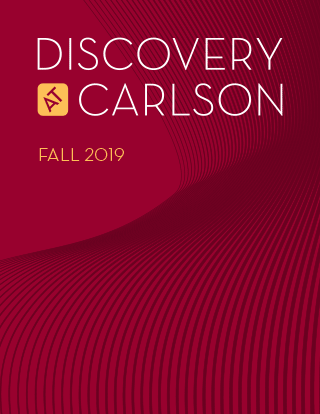
Professor Alok Gupta Helps Define How Much Data Companies Should Review
Friday, November 15, 2019
Is more information always better? Given that companies and marketers try to collect as much of it as possible, a person might certainly assume so.
But research by Professor Alok Gupta shows that too much information is a disadvantage. How much is optimal has long been a research thread for Gupta, and some of his recent findings changed how the world’s largest flower auction house does business.
“More information is not always good,” Gupta says. “The level of data has to be decided rather carefully. More isn’t always better.”
Evaluating auction data in the floral industry
Gupta studied the workings at Royal FloraHolland, a cooperative of buyers, sellers, and auctioneers that trades in 20 million cut flowers a day. Dubbed by Forbes magazine as a “Wall Street for Flowers,” the century-old auction is a model of efficiency as the delicate, perishable goods must be auctioned early in the day to get shipped quickly to their worldwide destinations. The auctions use a multi-unit, multi-round auction for a given lot of flowers and sell multiple lots during a given day. A bidder can buy part of a lot during a given auction of a lot.
This research is a part of a series of research efforts that “create time” using analytics to auction more flowers in the limited window of time available. Gupta has worked with FloraHolland to make a number of changes based on research studies, including ending a long-held tradition of the auction house: It no longer announces who placed the winning bid during an ongoing auction for a lot. Unlike before, buyers have no idea who has been placing bids to win the auction at any time while it is in progress.
“A lot of the large buyers often don’t want other people to know what they are buying, so they were interested in changing this but didn’t know what the impact would be,” Gupta says.
At the auction, a flurry of activity so interesting and beautiful it even draws tourists, Gupta conducted a field experiment between the traditional policy that disclosed the winners’ identities and an alternative policy that concealed the identities.
Concealing identities promotes stable prices
The latter policy resulted in average winning prices increasing by more than 6 percent when identities were hidden from public view. In addition, under the established system prices had a tendency to fluctuate not just day-by-day but over the various auctions throughout the day. With unidentified buyers, prices fluctuated less.
“It shows there is more predictability in a given day,” Gupta says. “That was a big positive out of this research. It sort of created a win-win environment that was somewhat unexpected for them.”
Two things can explain the difference, Gupta’s research showed. One was the possibility of collusion between buyers when they know who is who. The other is bidders trying to mimic what their competition does. Without identifying winning bidders, buyers are using more sound logic and economic factors to make their decisions.
More information is not always good. The level of data has to be decided rather carefully.
A lasting impact on business practice
Six months after the research team presented its results to Royal FloraHolland, the auction house announced it would no longer identify who held the winning bid.
Using data to understand the decision-making process has many other potential impacts for the auction house, and Gupta is continuing his research in that direction. The auction houses are catching on, too, he says.
“Auction houses are hiring data analysts within their organizations,” he says. “In the last 10 years, we have changed their view on using data for decision-making.”

